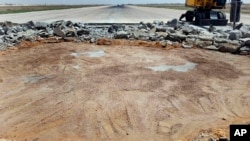Arab media is reporting that an Israeli airstrike on a weapons depot in the vicinity of the Damascus Airport has left at a number of Syrian government soldiers and pro-Iranian militia fighters dead.
Syrian TV reported that government anti-air defense missiles responded to the Israeli airstrikes that took place early Saturday morning in the region of Damascus Airport. It was the latest Israeli attack on Syrian territory since Israeli missiles hit targets at Aleppo Airport on September 6.
Ramy Abdel Rahman of the Britain-based opposition Syrian Observatory for Human Rights told Arab media that five government soldiers and two pro-Iranian militia fighters were killed in the Israeli airstrikes overnight.
He notes it was not clear if the Israeli attack was inside or outside the direct perimeter of Damascus Airport but says the explosion of a weapons depot that was targeted could be heard not far from an area controlled by Lebanese Hezbollah militia fighters.
Israeli media indicated the attack was the 25th by Israeli forces on Syrian territory so far this year. Saudi-owned al-Arabiya TV reported that pro-Iranian militia forces withdrew recently from their positions near Deir el-Zour in the east of Syria over “fears of security lapses."
In addition to the strike on pro-Iranian militia forces near Damascus Airport, Israeli attacks included positions near the Damascus suburbs of Sayeda Zeinab, al-Kuswa and an area called Ghasoula Farms. Lebanon's Hezbollah militia is reported to store rockets and drones in the area.
Syrian analyst Bassam Tallab told government TV that several foreign governments, including Turkey, Israel and the U.S. are "continuing aggressive policies inside Syrian territory in the north and east of the country," asserting the ongoing conflict in Syria "serves Israeli interests."
Khattar Abou Diab, who teaches political science at the University of Paris, told VOA that despite the Russian presence in Syria, Israel is continuing to attack weapons stockpiles of pro-Iranian militia forces in the country when it feels they represent a threat.
He said Saturday's attack is just one more targeting the Iranian military infrastructure in Syria, including efforts by Tehran to supply Lebanon's Hezbollah with precision-guided missiles and other weapons from Iran's military complex in Syria and elsewhere.
Russia recently withdrew one of its S-300 anti-missile defense systems from Syria's coastal region near Latakiya, taking it to Crimea, as its conflict with Ukraine continues. It is not clear if that has prompted more aggressive Israeli targeting of Syrian territory.
Abou Diab says tensions between Israel and Lebanon's Hezbollah "could spark a conflict at some point" amid the ongoing dispute over maritime borders between the two countries and offshore gas resources.
Hezbollah leader Sheikh Hassan Nasrallah reportedly threatened to target Israel's offshore gas operations Saturday, amid the tensions.
Joshua Landis, who heads the Center for Middle East Studies at the University of Oklahoma, told VOA, "Iran and Israel are fighting each other in Syria," and that "high-stakes negotiations over Iran's nuclear capacity have reached a crescendo, which partly explains the more dramatic attacks on Iran in Syria."




